05 Oct Tips to Pass the Architect Registration Exam


MY COLLECTION OF STUDY MATERIALS
Tips to Pass the Architect Registration Exam
The path to becoming a licensed architect can seem like a long road filled with potholes that can leave you feeling discouraged. In this post, I want to share my story with you, along with a few tips to encourage you as you prepare to dominate your Architect Registration Examination (ARE).
I’ve broken this blog post into sections for those who would like to skip to the tips and study material recommendations. (8 minutes of reading)
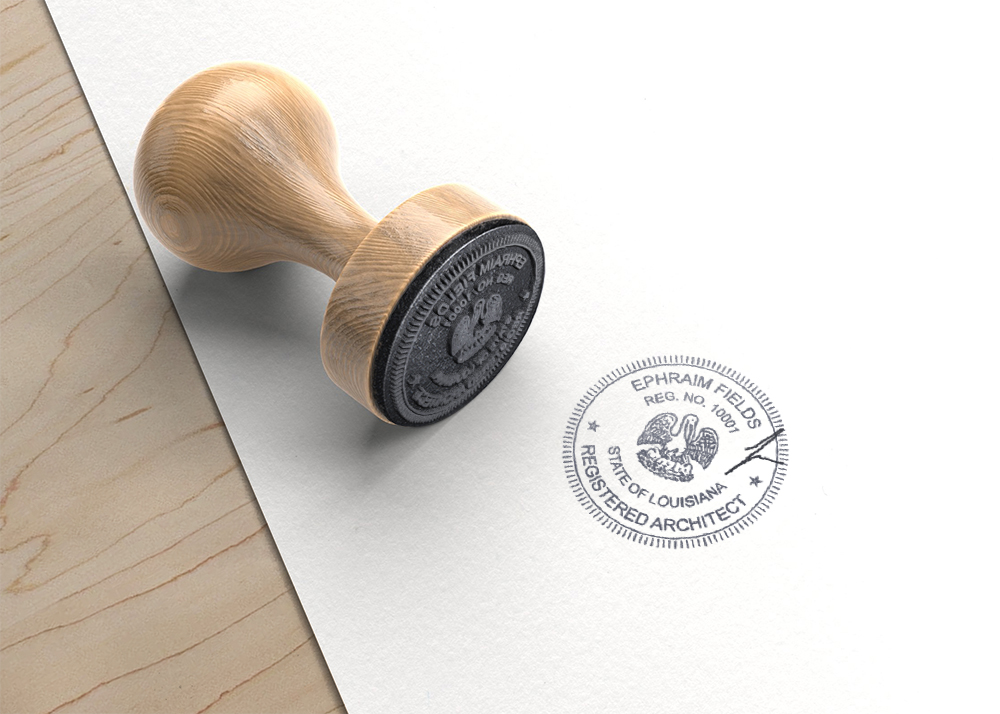

Finally Registered!
my story
Hi, my name is Ephraim Fields. I graduated from Louisiana Tech University with a Masters in Architecture in 2015. After graduation, I worked a few years for a small firm in Louisiana where I was able to gain hands-on experience in various aspects of the business working on commercial, government, and mixed-use projects. Today, I currently work for the Department of Defense where I am passionate about contributing to the built environment to advance our mission.
Did you always know you wanted to be an Architect?
Where I’m from, Shreveport Louisiana, the words architect, and architecture were rarely spoken or considered in my neighborhood. Growing up, I didn’t know any architects or what they did. I just knew I had a passion and curiosity for art, creativity, and tearing stuff up to figure out how it works. My mother would always say that I would become the first architect in our family, as I enjoyed sketching perspectives of my surroundings and building things around our house. Her words stuck with me long after she passed in 2004 and resonated even stronger when the time came for me to decide on my college major. It was a decision between art (my passion) & architecture (the unfamiliar yet curious). Throughout my college studies, I grew a deep appreciation and passion for Architecture and the built environment. After I graduated, I knew without hesitation that the next step for me would be to pursue an Architect License.
In 2016 I began my journey testing for the Architect Registration Examination. After 7 years and 16 exams later, I can proudly call myself a registered Architect! This was the toughest accomplishment yet and I have learned so much more about this industry and myself.
I’ve always thought more like a creative and strategic thinker than an exam wiz. I was never the best with standardized tests and have always had to study diligently for exams. I was never great at “failing” either so let’s just say that the biggest thing I’ve learned over these past 7 years is resilience, how to overcome failure, and how to adapt my approach to studying and taking exams. After all, I failed 11 times! (There are only 6 exams total.)
Remember, there aren’t any awards given for a perfect testing record so try not to catastrophize failure, failing multiple times is not bad.. just expensive.😅
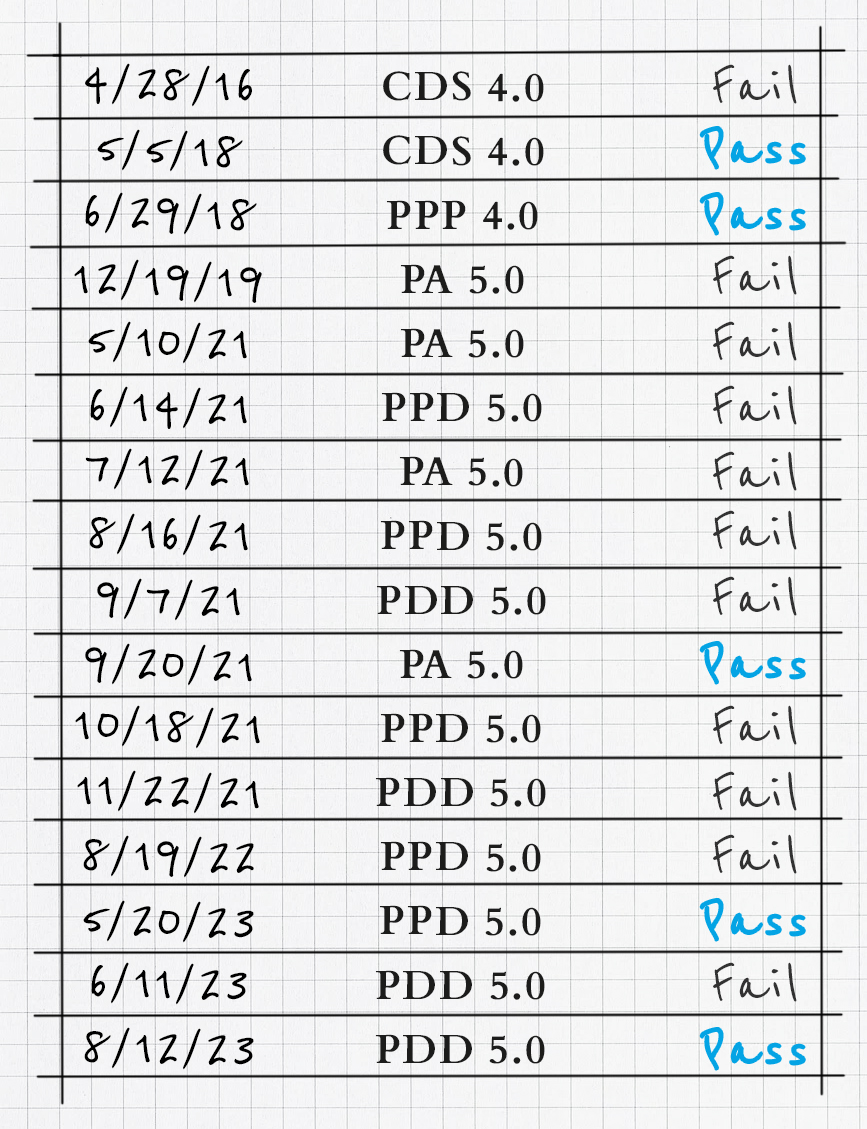

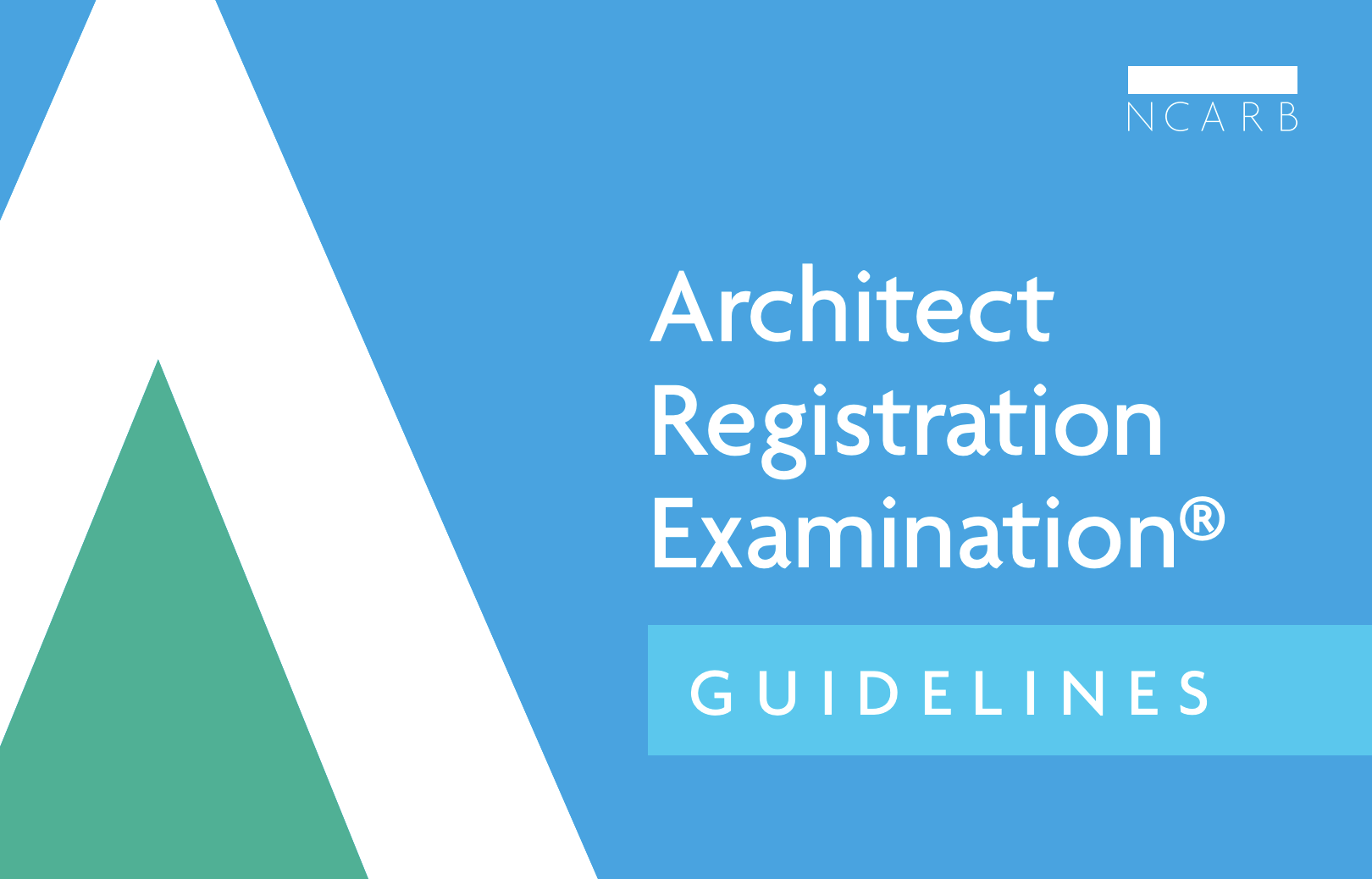

ncarb guidelines can be found at ncarb.org
four Steps to Get Started
- Start with NCARB’s Guidelines
- I think the best place to start is NCARB’s website. The NCARB website provides all the resources you will need to get an understanding of the AXP process, the exam division format, and recommended study materials.
- Create your study plan
- Grab a calendar and plan your study time. Take into consideration holidays, vacations, and other busy seasons in your life. I found it helpful to schedule an exam, and then create a study plan working backward from that date. This helped me commit to studying.
- Establish a support community
- Join a community or put together a study group. I found it very beneficial studying with previous classmates who were also testing, not only because we were able to hold each other accountable, but we were also able to share insights and, more than often, vent about our paths to licensure.
- Start your journey
- Embrace the studying process and journey of becoming an architect. Start with a bigger perspective of becoming an expert in your field, rather than simply memorizing information for the exam. I found reading through textbooks more enjoyable when I shifted my focus to gain a deeper understanding of the industry.
Important Tips
With so many study resources and materials out there, I want to leave you with a few non-technical tips and lessons that I’ve learned along the way.
- Do not test alone.
- Gather a few old classmates and coworkers to encourage and hold each other accountable. Studies show that we are more likely to achieve our goals when we share them with others. If you can’t find study partners, engage your close community or church group for support. Their encouragement along the way will be instrumental in keeping you grounded.
- Have a plan for failure.
- NCARB reports a pass rate between 47%-65%, with an average of 55.5% in 2022. So, it is safe to say that approximately 55% of testing candidates will leave their exams disappointed. Disappointment is natural, we are human and this emotion shows we truly care about reaching our goals. However, disappointment that isn’t addressed can lower your expectations moving forward to your next exam. It can cause you to lose hope in your pursuit and develop false beliefs that licensure isn’t possible for you. I failed the first test I took and I didn’t retest again for 2 years, because I thought the failure meant that I wasn’t ready to start my testing journey. Best word of advice to myself, get over the fear of failure. I eventually decided that if/when I failed, I would reschedule my next test immediately and focus my studies on any information that I did not know.
- But do not plan to fail.
- This lesson took the longest to learn but was the most pivotal for me in decreasing my testing anxiety. *Always go into the test knowing you are going to pass.* If you fail, deal with disappointment after but not before. No matter if or how many times you fail, do not let failure impact the energy that you go into the next test with. Having thoughts of failure during or before your test is detrimental to your performance during your test. There is barely enough time to read each question, so be sure to kill any negative and unproductive thoughts immediately to protect your focus.
- Be inspired by others’ achievements, not discouraged.
- Your friends and colleagues may finish before you, celebrate with them. People move in different seasons at different paces. People have different priorities and responsibilities. People face different circumstances and situations. Stay focused on your path and remember to help the next person.
- Eliminate Distractions.
- Identify your priorities and responsibilities while you are testing and be okay with other things taking the backseat. Protect your time and energy. Testing requires a big investment mentally and emotionally. Allow yourself to be fully invested and dismantle the myth of multitasking. Binge-watching your favorite show while studying is not a good idea (for me it was Game of Thrones). Also, don’t add other big tasks to your plate when you are in study mode. It will delay your progress and impact your studies. This was a challenge because I had a bad habit of juggling many things at once; too many side projects, personal business, and work often took priority over studying.
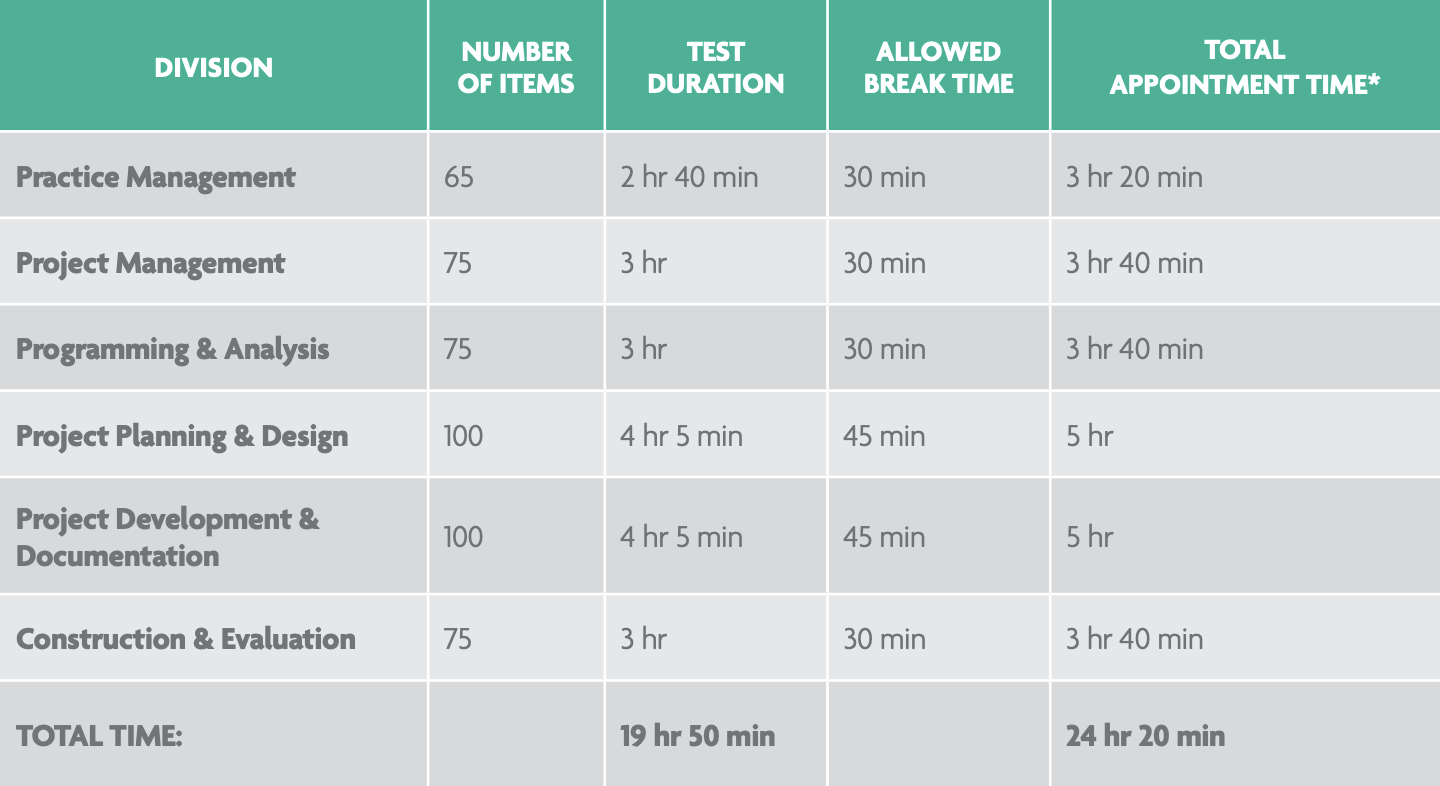

Exam appointment time excert from ncarb guidelines
exam strategy
For anyone like myself who is not a good standardized test taker, I would recommend spending extra time developing an exam strategy to help decrease testing anxiety and improve your success. Learning how to take the exam is just as important as learning the actual material. When 5.0 came along, the case studies immediately felt like middle school end-of-year reading and comprehension tests, increasing my testing anxiety. This required me to hone testing skills and strategies to quickly skim information for relevancy and focus on speed so that I could finish all questions.
- Develop an exam approach
- I began with the case studies first, giving approximately 30 minutes to each. Reading through the supplemental information and references was helpful in refreshing information that I could use later in the exam. After the case studies and a few multiple-choice questions, I always had to take a break to recover. I found that to be the perfect break time, usually allowing myself roughly 2 minutes per question upon returning to the exam.
- I skipped any formula/math problems, flagging them to come back to later. Every question is weighted the same, so it is best to review all questions first and answer the simple ones, before getting into time-consuming formulas.
- Avoid overanalyzing
- Remember the exam questions are designed to evaluate your comprehension of a particular concept. Try to identify and focus on the concept in question and avoid overthinking. This is where I struggled because I would approach the exam questions analytically and pull in industry experience, which ultimately steered me away from the actual concept that NCARB was evaluating my comprehension of.
- Practice taking the exam
- Take as many practice exams as you can. NCARB provides a free exam simulator that uses the exact interface of the exam and gives feedback after each question. This helped to increase my speed in quickly identifying what particular concept NCARB was evaluating me on.
- Fully understand the basics
- Strive to fully understand your professional role and responsibilities within the practice of architecture. This seemingly basic knowledge will guide your approach to various exam questions.
- Apply what you’re studying
- Treat work as study material application time. Seek out ways to expose yourself to on-the-job application of NCARB exam concepts and processes to help you retain information and have a lasting impact on your career.
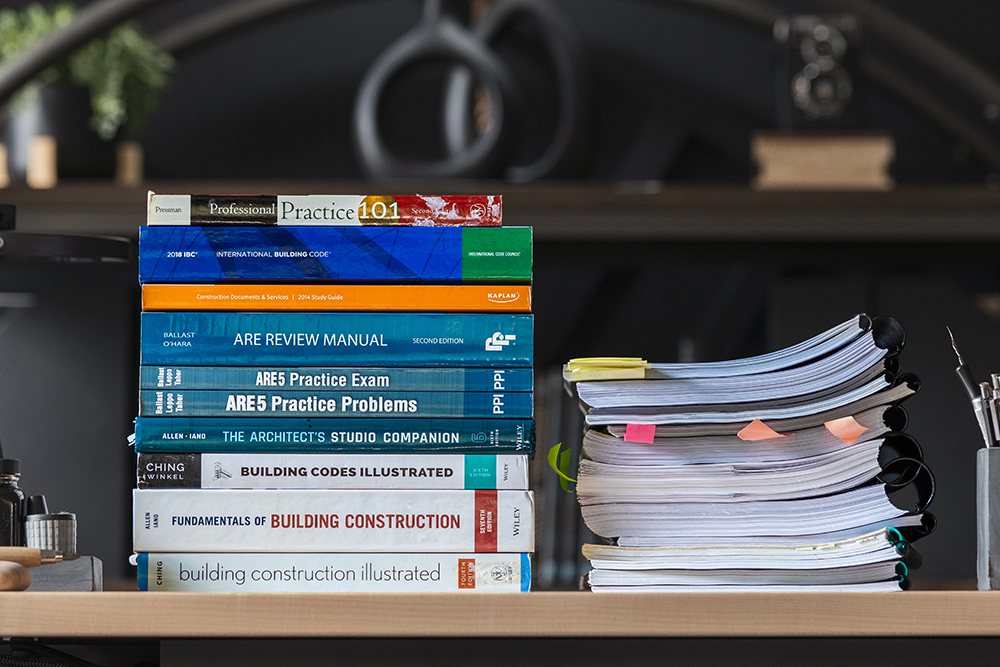

my collection of study materials
Study Materials
Over the course of 7 years I have found my study material collection to be quite overwhelming and eventually came to realize that no perfect study material exists. They all seem to have gaps and should be supplemented with other material. I personally started off using Architect Exam Prep (the audio companion was a convenient supplement) and Ballast. Towards the end of my exam journey I focused on reading the NCARB recommended text books and had turning success in passing my last exams. I realized all the other exam prep materials pull information from and references were referencing those same books. After consecutively failing PPD & PDD I committed to reading Fundamentals of Building Construction and MEEB books from cover to cover focusing on relevant chapters.
Programming & Analysis (PA) 5.0
- Site Planning and Design Handbook (chapters 1-4, 7-9, & 10)
- Architect’s Studio Companion (cover to cover)
Project Planning & Design (PPD) 5.0
- Building Construction Illustrated (cover to cover)
- FEMA Earthquake Manual (chapters 4, 5, 8, & 9)
- Architectural Graphic Standards (for diagrams)
Project Development & Documentation (PDD) 5.0
- Fundamentals of Building Construction: Materials and Methods (cover to cover)
- Mechanical & Electrical Equipment for Buildings (chapters 7, 8, 9, 10, 25, 26, 37)
- IBC (chapters 3, 4, 5, 6, 7, & 10)
Supplemental Practice Exams
- *NCARB Practice Exam
- *Black Spectacles
- *Designer Hacks
- Architect Exam Prep
- *Ballast
- *Walking the ARE



